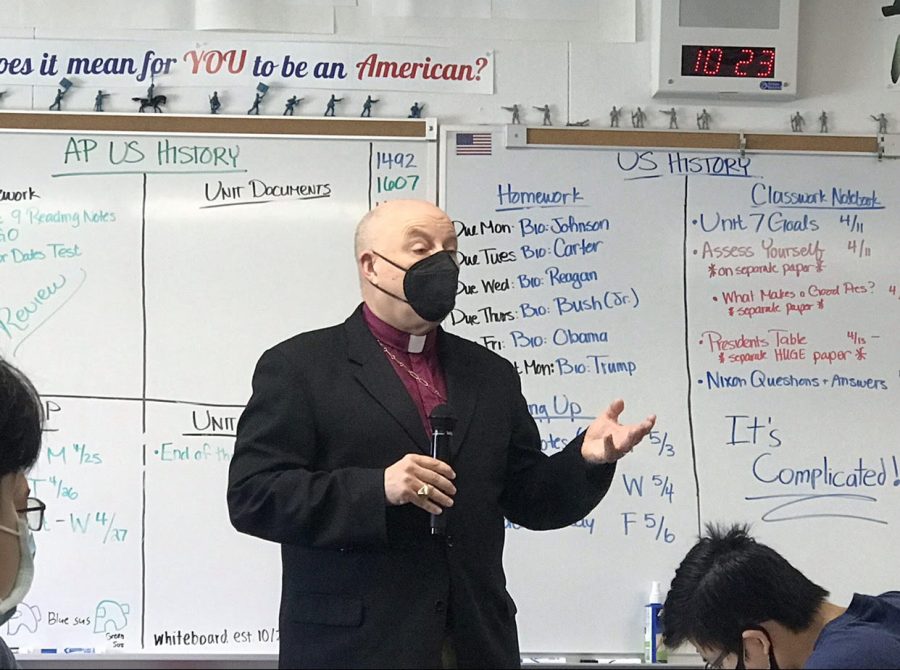Bishop John Harvey Taylor at AHS
May 27, 2022
Bishop John Harvey Taylor of the Episcopal Diocese of Los Angeles came to Arcadia High School (AHS) for the first time on Apr. 22 to speak to U.S. History and AP U.S. History (APUSH) teacher Mrs. Heather Moore’s students about the former U.S. President Richard Nixon and his experience working as Nixon’s New York Chief of Staff.
Taylor is the former executive director of the Richard Nixon Library and Museum. During his speech, he emphasized Nixon’s local influence, referring to Nixon having represented California’s 12th congressional district which included Arcadia. Taylor talked about some positive political actions that Nixon took, such as launching the “war on cancer,” signing Title IX which protects people from sex-based discrimination in educational programs, and desegregating schools that were most resistant to the ruling of Brown v. Board of Education of Topeka.
Taylor described Nixon as a pragmatist, judging things on a case-by-case basis rather than molding all of his decisions to satisfy a certain ideology. Taylor believes that pragmatism is a “lost art” in modern-day America where politics are polarized and often oversimplified.
Taylor also talked about Nixon’s personality and how it influenced his mixed legacy. Taylor mentioned that Nixon was very introverted and shy, afraid of strangers and the possibility of being looked down upon. However, Taylor speculated that Nixon’s paranoia led him to exhibit some un-American values such as aggressively pursuing what he wanted, sometimes illegally.
As Taylor went over the history of Nixon’s early political career and presidency, he passed around artifacts for students to touch and see up close. These included a photo of Nixon and a younger Taylor, a pair of Nixon’s reading glasses, Nixon’s necktie, Nixon’s handwritten notes from 1989 about the Tiananmen Square Massacre, and a photo of Nixon’s casket aboard the same plane that carried JFK’s body.
Next, Mrs. Moore’s students had the opportunity to ask Taylor questions about Nixon that they had prepared the previous day.
Of course, there were many questions regarding one of the biggest presidential scandals in American history: Watergate. Many students asked about how Nixon felt after being exposed. Taylor responded by saying that Nixon was embarrassed by the fact that the Watergate scandal essentially ended his term as President and that although Nixon was overcome with immense guilt and shame, he was too prideful to ever apologize to the American people. Taylor sensed that Nixon never felt any rage toward the two Washington Post journalists and others who had outed him, but rather, deep down, Nixon was judging himself the most. Despite having been banned from political affairs, Nixon tried to make up for Watergate by building good relations with other politicians such as former U.S. Presidents Gerald Ford, Jimmy Carter, George H. W. Bush, and Bill Clinton, along with Senator Bob Dole from Kansas, and former California governor Pete Wilson.
When asked about the lasting consequences of Nixon’s resignation, Taylor said that it had discredited the moderation and pragmatism that Nixon stood for and had created continual deep distrust in institutions that were previously relied on.
Taylor did not hold back when asked about where Nixon fell short as President. He pointed out that Nixon had made foreign policies and stabilized relations with China and Russia through the détente; however, today, the U.S. has the most tension with China and Russia. Nixon’s strategies had immediate positive results but did not seem to last. Taylor stated that Nixon had failed to do what was in all citizens’ best interest, because a president should not do things just for those who had voted for them. He said that Nixon had also built up too much suspicion toward the people around him due to his paranoia and belief that the press and CIA were out to get him. Taylor thinks that Nixon cared more about foreign matters than domestic affairs, where his priorities should have been, because Nixon wanted to make big moves and play the “big world chess game.”
As an active, engaging activity to break up his speech, Taylor asked the students for their birthdays and gifted a copy of his own book, Jackson Place: A Novel, to the student whose birthday was closest to Nixon’s (Jan. 9). Jackson Place: A Novel details what Taylor thinks would have happened if Nixon hadn’t resigned and includes the draft of a speech that Taylor wished Nixon would have given regarding Watergate.
APUSH student junior Jason Kyi said, “In asking Mr. Taylor questions, I was surprised by how much Nixon’s paranoia and somewhat Napoleonic complex played into his foreign, domestic, and personal policy and his eventual downfall with the Watergate scandal and despite his strong sense of paranoia towards others, Mr. Taylor had worked with him for many years and they were still able to have a good working relationship.”
“The two things that stood out to me was, first, how somebody with politics very different from President Nixon’s could work with him in a very constructive way and find his humanity,” said Mrs. Moore. “I think that’s extremely hopeful for our very politically divided society today. I also liked how he was able to humanize President Nixon for me and my students. The fact that Nixon chewed on his reading glasses. The fact that he didn’t like any music that wasn’t classical. That he was so uncool that he did not own a pair of sunglasses. It helps remind us that these people that we study in history were, in fact, really just people like us.”
After the class period was over, several students went up to Taylor, asking other questions, taking another look at the artifacts, and getting his autograph. Learning from Taylor about Nixon was very enlightening for many of the students who were there to listen, and hopefully, Taylor can come back soon to talk to new U.S. History scholars!

